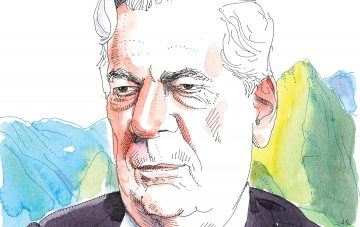Patrick Iber in The Nation:
 Literature is fire,” Mario Vargas Llosa declared in 1967, when he accepted a prize commemorating Rómulo Gallegos, the esteemed Venezuelan novelist and former president. Gallegos represented the center-left tradition in Latin America, and Vargas Llosa was determined to challenge his audience from the left. Literature, the Peruvian novelist continued, “means nonconformism and rebellion…. Within ten, twenty or fifty years, the hour of social justice will arrive in our countries, as it has in Cuba, and the whole of Latin America will have freed itself from the order that despoils it, from the castes that exploit it, from the forces that now insult and repress it.” Nearly 40 years later, in 2005, Vargas Llosa received a very different sort of prize and delivered a very different kind of speech. Accepting the Irving Kristol Award from the American Enterprise Institute, he denounced the Cuban government and called Fidel Castro an “authoritarian fossil,” praised the Austrian School economist Ludwig von Mises as a “great liberal thinker,” and defended calls for privatizing pensions. It was quite a remarkable transformation. In the opening paragraph of Vargas Llosa’s 1969 novel, Conversation in the Cathedral, the protagonist asks: “At what precise moment had Peru fucked itself up?” It is a question that many people have asked as well of Peru’s greatest novelist.
Literature is fire,” Mario Vargas Llosa declared in 1967, when he accepted a prize commemorating Rómulo Gallegos, the esteemed Venezuelan novelist and former president. Gallegos represented the center-left tradition in Latin America, and Vargas Llosa was determined to challenge his audience from the left. Literature, the Peruvian novelist continued, “means nonconformism and rebellion…. Within ten, twenty or fifty years, the hour of social justice will arrive in our countries, as it has in Cuba, and the whole of Latin America will have freed itself from the order that despoils it, from the castes that exploit it, from the forces that now insult and repress it.” Nearly 40 years later, in 2005, Vargas Llosa received a very different sort of prize and delivered a very different kind of speech. Accepting the Irving Kristol Award from the American Enterprise Institute, he denounced the Cuban government and called Fidel Castro an “authoritarian fossil,” praised the Austrian School economist Ludwig von Mises as a “great liberal thinker,” and defended calls for privatizing pensions. It was quite a remarkable transformation. In the opening paragraph of Vargas Llosa’s 1969 novel, Conversation in the Cathedral, the protagonist asks: “At what precise moment had Peru fucked itself up?” It is a question that many people have asked as well of Peru’s greatest novelist.
Vargas Llosa is unquestionably one of the most important writers of his generation. He has written 18 novels, at least five of them considered by critics to be of great literary significance. His first, The Time of the Hero, was published in 1963. It dramatizes an act of rebellion by the cadets at Peru’s Leoncio Prado military academy, which led to copies of the book being burned on the school’s parade ground. His next novel, The Green House, was published in 1966 and proved to be a difficult modernist work which depicted Peruvian reality as a confluence of the Catholic Church, the military, indigenous culture, and the brothel that gives the novel its name. A powerful experiment in form, The Green House has usually been read as a critique of capitalism, imperialism, and patriarchy, and it helped cement Vargas Llosa’s reputation as one of the key writers of the “boom” generation in Latin American letters.
More here.
